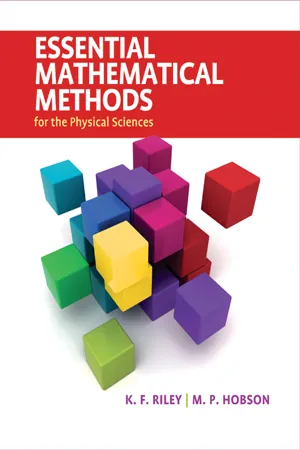
- English
- PDF
- Available on iOS & Android
Essential Mathematical Methods for the Physical Sciences
About this book
The mathematical methods that physical scientists need for solving substantial problems in their fields of study are set out clearly and simply in this tutorial-style textbook. Students will develop problem-solving skills through hundreds of worked examples, self-test questions and homework problems. Each chapter concludes with a summary of the main procedures and results and all assumed prior knowledge is summarized in one of the appendices. Over 300 worked examples show how to use the techniques and around 100 self-test questions in the footnotes act as checkpoints to build student confidence. Nearly 400 end-of-chapter problems combine ideas from the chapter to reinforce the concepts. Hints and outline answers to the odd-numbered problems are given at the end of each chapter, with fully-worked solutions to these problems given in the accompanying Student Solutions Manual. Fully-worked solutions to all problems, password-protected for instructors, are available at www.cambridge.org/essential.
Tools to learn more effectively

Saving Books

Keyword Search

Annotating Text

Listen to it instead
Information
Table of contents
- Cover
- Half-title
- Title
- Copyright
- Contents
- Preface
- Review of background topics
- 1 Matrices and vector spaces
- 2 Vector calculus
- 3 Line, surface and volume integrals
- 4 Fourier series
- 5 Integral transforms
- 6 Higher-order ordinary differential equations
- 7 Series solutions of ordinary differential equations
- 8 Eigenfunction methods for differential equations
- 9 Special functions
- 10 Partial differential equations
- 11 Solution methods for PDEs
- 12 Calculus of variations
- 13 Integral equations
- 14 Complex variables
- 15 Applications of complex variables
- 16 Probability
- 17 Statistics
- Appendix A: Review of background topics
- Appendix B: Inner products
- Appendix C: Inequalities in linear vector spaces
- Appendix D: Summation convention
- Appendix E: The Kronecker delta and Levi--Civita symbols
- Appendix F: Gram-Schmidt orthogonalization
- Appendix G: Linear least squares
- Appendix H: Footnote answers
- Index
Frequently asked questions
- Essential is ideal for learners and professionals who enjoy exploring a wide range of subjects. Access the Essential Library with 800,000+ trusted titles and best-sellers across business, personal growth, and the humanities. Includes unlimited reading time and Standard Read Aloud voice.
- Complete: Perfect for advanced learners and researchers needing full, unrestricted access. Unlock 1.4M+ books across hundreds of subjects, including academic and specialized titles. The Complete Plan also includes advanced features like Premium Read Aloud and Research Assistant.
Please note we cannot support devices running on iOS 13 and Android 7 or earlier. Learn more about using the app